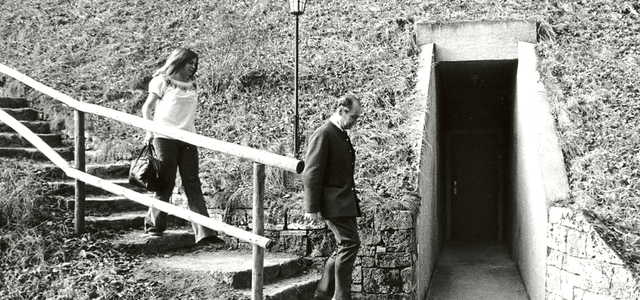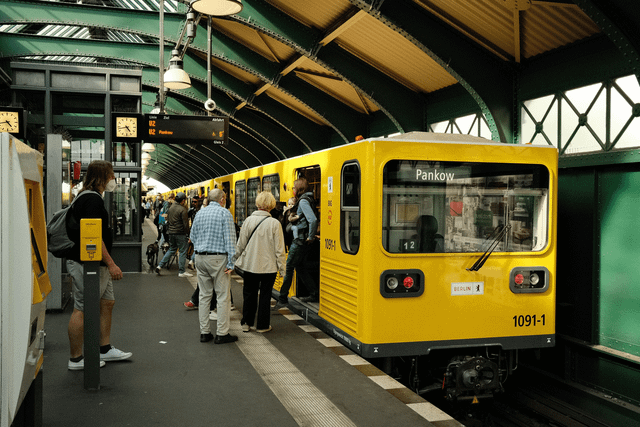
Between 1964 and 1989, almost 400 volunteers went to the Andechs research bunker. Shielded from external clocks, from daylight and from other people, they lived underground for many weeks. The experiment marked the birth of chronobiology.
A narrow, concrete path leads up the hill to the front door of the old Wehrmacht bunker in Andechs, Upper Bavaria. The researchers had set up their isolation cell down here: a small underground apartment, accessible only through an airlock, cut off from the outside world, from daylight and noise, from radio, television, telephone – and every clock. The furnishings were spartan: fluorescent lights on the ceiling, a small bathroom, a small kitchen. The living room is sober with a desk, bed and armchair. There were no windows, air conditioning provided air.
Whoever moved here, voluntarily and for at least four weeks, saw no human being for exactly that long, heard no sound that he did not produce himself. There was no encounter with the researchers either, food and drink were placed in the lock, communicated via note messages. Sound scary? Almost 400 people went to the Andechs research bunker between 1964 and 1989. And most of them were very sad when they had to leave him again.
For chronobiology – the science that studies the biological rhythms to which humans are subject – the results of the Bunker experiment were a breakthrough. The behavioral physiologist and then head of the Max Planck Institute, Jürgen Aschoff, one of the pioneers of chronobiology, who died in 1998 at the age of 85, began the series of experiments in 1964 with the big question: Are rhythmic processes in the human organism, i.e. to For example, sleep-wake phases, body temperature or the speed of cell division depend on external factors such as light or time measurement – or are they controlled by an internal clock? Aschoff and his colleagues were interested in how people’s rhythm would develop if they were completely shielded from external clocks such as light and darkness or the ticking of the clock.
24 hours? The day in the bunker was longer
The result was: Even in the bunker, they stayed awake for around two thirds of the day and slept a third. For most of them, the scientists found that they got up a little later every day. And that their days lengthened to 24.7 to 25.2 hours within a short period of time; it then remained underground during the entire time. This made it clear: an internal clock controls our daily course and our bodily functions. The interesting conclusion from this: It is not healthy in the long run if people live against their inner time – then there is a risk of sleep disorders, difficulty concentrating, and a weakened immune system.
For years, chronobiologists have been demanding, for example, that the early start of school in Germany be postponed by one hour – because the conflict between their own biological time and that prescribed by society puts young people in a kind of permanent jet lag.
Jürgen Zulley, 73, psychologist and sleep researcher, was involved in the bunker experiment from 1974 – as a doctoral student and later project manager in Professor Aschoff’s team – and as a test subject. As a 29-year-old, Zulley lived in the isolation apartment for four weeks. Today he is an adjunct professor at the University of Regensburg, writes books and gives lectures on the subject of sleep. “In the first few days in the bunker, I was confused because I didn’t know if it was really time for a night’s sleep when I felt tired. But that quickly caught on and you just lived to your own rhythm.”
Zulley and most of the other subjects read a lot and listened to music. Many students preparing for the exam applied to take part, but also older people – the oldest, Zulley recalls, was 92 years old. The ratio of men and women was roughly balanced – only among the over 60 year olds were women more interested.

What was so appealing about isolating yourself for weeks? Probably also back then: the longing to get off the hamster wheel, away from the hustle and bustle, noise and stress. to find rest. to have time to think. “The lack of stimulation that prevailed in this bunker,” says Jürgen Zulley, “made you much more concentrated. Listening to music, for example, I found that so intense there – fantastic! It was better than in any concert hall.” In the bunker he read difficult books with much less effort. This was also the case for many other test subjects; most use the time to read or study.
They could order books by sending messages to the scientists. Plants were also very popular, something blooming and green. From time to time there was a good Andechser beer, brewed a few hundred meters away in the monastery brewery. “That was typical for Jürgen Aschoff.” Zulley laughs. “He was of the opinion: If the participants want a beer, they can get one. However, I later canceled the revealing gesture with the beer. Because some seemed to hoard it.”
Did Zulley learn life skills while underground? About his idea of time, how he wants to live and fill it? He believes: In our everyday life it is difficult to realize how important time off is. And how much the everyday stimuli overwhelmed you. “The state of calm and concentration in the bunker was a very important experience for me.” Zulley also knew quite well about the motives and emotional states of his test subjects – they wrote diaries, many in detail. During the weeks underground they thought about their lives. “Sometimes we found inscriptions on the walls. Then it said, for example: Now I finally know what gets on my nerves – myself.”
Get out of the bunker? Don’t!
There was never a shortage of volunteers. Cabin Fever or Panic Attacks? Nothing, only four percent broke off their stay due to external circumstances. Maybe it was because the door was never locked, you could leave at any time. But on the contrary, many participants were downright angry when Zulley and his colleagues put a note in their lock at some point: Tomorrow is the day, the experiment is coming to an end. Since their days had lasted longer than 24 hours, they sometimes “missed” entire days. Many didn’t want to go out into the noisy, exhausting real world. “Some had taken their annual leave and would have preferred to book a break in the bunker again.”

Zulley met many subjects at the exit door. Some asked him: do we make the best of it and go to the monastery brewery? “We then went up the mountain to the beer garden with them, but we already knew how it would end,” he says. “As soon as we arrived we had to turn around. Too many people, everything too loud and too hectic. Our normal life was total sensory overload for her.”
Guest post from Enormous
Text: Christian Sobiella/Christiane Langrock-Kögel
enormous is the magazine for social change. It wants to encourage and under the claim “The future starts with you” to show which small changes each individual can make a contribution to. In addition, it presents enormously inspiring doers and their ideas as well as companies and projects that make life and work more future-proof and sustainable. Constructive, intelligent and solution-oriented.
Read more on Techzle.com:
- Reduce stress: 7 tips to slow down your life
- “Not everyone has to walk 10,000 steps a day” – Ingo Froboese recommends a different rule
- Being alone: reasons for loneliness and how to deal with it